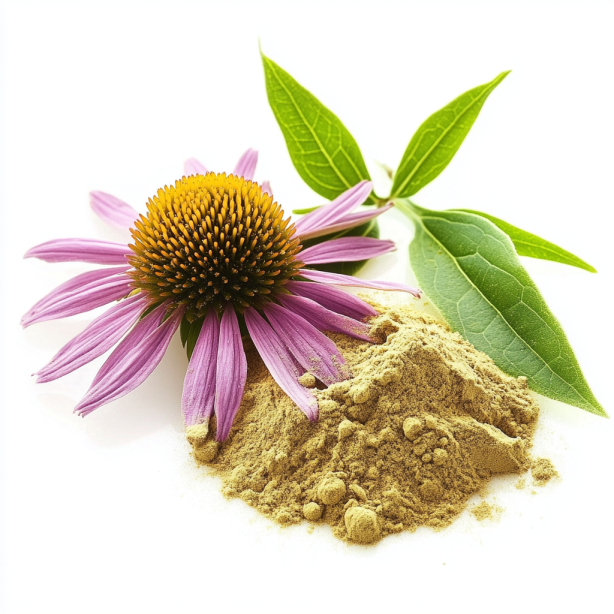Is Echinacea Extract Powder Safe?
2025-07-15 11:17:03
Echinacea extract powder, derived from the popular purple coneflower, is generally considered safe for most people when used as directed. This natural supplement, known for its potential immune-boosting properties, has been widely used in traditional medicine for centuries. While Echinacea Extract Powder offers numerous health benefits, it's essential to understand its safety profile and potential side effects. As with any supplement, individual responses may vary, and consulting with a healthcare professional before incorporating it into your routine is advisable, especially for those with pre-existing conditions or taking medications.

Potential Side Effects: What You Need to Know
While Echinacea Extract Powder is generally well-tolerated, it's crucial to be aware of potential side effects that may occur in some individuals. Understanding these possible reactions can help users make informed decisions about incorporating this herbal supplement into their wellness routines.
Rare Cases of Liver Injury: Understanding the Risks
Although uncommon, there have been isolated reports of liver complications associated with Echinacea use. These cases are extremely rare and often involve other contributing factors. Individuals with a history of liver disease or those taking medications that affect liver function should exercise caution and consult their healthcare provider before using Echinacea Extract Powder. It's important to note that the vast majority of users experience no liver-related issues, and the overall risk is considered low.
Allergic Reactions: Identifying Symptoms and Precautions
Some people may experience allergic reactions to Echinacea, particularly those with sensitivities to plants in the daisy family. Symptoms of an allergic reaction can range from mild to severe and may include skin rashes, itching, swelling, or difficulty breathing. If you have known allergies to ragweed, chrysanthemums, marigolds, or related plants, it's advisable to approach echinacea root extract with caution. Always start with a small dose to test for any adverse reactions before increasing consumption.
Digestive Issues: Managing Common Gastrointestinal Effects
Gastrointestinal discomfort is one of the more frequently reported side effects of echinacea extract powder. Some users may experience mild nausea, stomach upset, or diarrhea when first introducing the supplement. These symptoms are typically transient and often resolve as the body adjusts to the new substance. To minimize digestive issues, it's recommended to start with a lower dose and gradually increase it over time. Taking Echinacea Extract Powder with food can also help alleviate potential gastrointestinal discomfort.

Drug Interactions: Consulting Your Healthcare Provider
Echinacea extract powder, while natural, can interact with certain medications and medical conditions. It's crucial to understand these potential interactions to ensure safe and effective use of the supplement. Always consult with a healthcare professional before adding Echinacea to your regimen, especially if you're taking other medications or have underlying health concerns.
Echinacea and Blood Thinners: Potential Complications
One of the most significant interactions to be aware of is between Echinacea and blood-thinning medications. Echinacea may affect blood clotting and could potentially enhance the effects of anticoagulant drugs like warfarin. This interaction could increase the risk of bleeding or bruising. Individuals taking blood thinners should speak with their doctor before using echinacea extract powder to assess the potential risks and determine if any adjustments to their medication regimen are necessary.
Immunosuppressants: Weighing the Risks for Certain Conditions
Echinacea is known for its immune-stimulating properties, which can be beneficial for many people. However, this effect may be problematic for individuals taking immunosuppressant medications or those with autoimmune disorders. The immune-boosting action of Echinacea could potentially interfere with the intended effects of immunosuppressive drugs used to treat conditions such as rheumatoid arthritis, lupus, or organ transplant recipients. If you have an autoimmune condition or are taking immunosuppressants, it's essential to discuss the use of Echinacea Extract Powder with your healthcare provider to evaluate the potential risks and benefits.
Caffeine and Echinacea: Possible Stimulant Interactions
Some studies suggest that Echinacea may affect how the body processes caffeine. This interaction could potentially lead to increased caffeine levels in the bloodstream, which might amplify caffeine's stimulant effects. While this interaction is not typically dangerous, it could result in heightened nervousness, jitteriness, or sleep disturbances in sensitive individuals. Those who consume significant amounts of caffeine or are particularly sensitive to its effects should be mindful of this potential interaction when using Echinacea Extract Powder.
Long-Term Use: Balancing Benefits and Precautions
When considering the long-term use of Echinacea extract powder, it's important to weigh the potential benefits against any precautions. While many people incorporate this herbal supplement into their daily wellness routine, understanding the implications of prolonged use is crucial for maintaining optimal health and safety.
Immune System Impact: Assessing Prolonged Echinacea Consumption
Echinacea is primarily known for its immune-boosting properties, which have made it a popular choice for supporting overall health. However, the effects of long-term, continuous use on the immune system are not fully understood. Some experts suggest that prolonged use might lead to a plateau in its effectiveness, while others argue that it can provide sustained immune support. To maximize the benefits of Echinacea purpurea extract powder, some healthcare professionals recommend cyclical use, such as taking it for a few weeks followed by a break, rather than continuous daily consumption.
Tolerance Development: Adjusting Dosage for Optimal Efficacy
As with many supplements, there's a possibility that the body may develop a tolerance to Echinacea over time. This could potentially lead to diminished effects with prolonged use. To address this, some users and practitioners advocate for periodic adjustments in dosage or taking breaks from the supplement. This approach, often referred to as "cycling," may help maintain the effectiveness of Echinacea Extract Powder over the long term. However, more research is needed to fully understand the implications of tolerance development and the most effective strategies for long-term use.
Monitoring Liver Function: Regular Check-ups for Safe Long-term Use
While serious liver complications from Echinacea use are rare, it's prudent to monitor liver function during long-term consumption, especially for individuals with pre-existing liver conditions or those taking medications that affect the liver. Regular check-ups and liver function tests can help ensure that prolonged use of Echinacea Extract Powder remains safe for your body. This proactive approach allows for early detection of any potential issues and provides peace of mind for those incorporating Echinacea into their long-term wellness strategy.
Conclusion
Echinacea extract powder is generally safe for most individuals when used as directed. However, like any supplement, it's not without potential risks and side effects. By being aware of possible interactions, allergic reactions, and the importance of proper dosage, users can make informed decisions about incorporating this herbal supplement into their wellness routines. Always consult with a healthcare professional before starting any new supplement regimen, especially if you have pre-existing health conditions or are taking medications. With proper precautions and guidance, Echinacea Extract Powder can be a valuable addition to a balanced approach to health and wellness.
Where to Buy Echinacea Extract Powder?
Hubei Sanxin Biotechnology Co., Ltd. stands out as a premier supplier of high-quality echinacea extract powder. As a national high-tech enterprise, they integrate scientific research, development, production, and sales. Their state-of-the-art facilities include over 4,942 acres of GMP planting base and two fully automatic production lines, yielding more than 800 tons of plant extracts annually. With FDA certification and Kosher certification, their products meet the highest standards of quality and safety. Hubei Sanxin's Echinacea Extract Powder is widely used in food, health products, medicines, cosmetics, veterinary drugs, and feed additives. Their global reach extends to more than 30 countries, including the United States, Japan, and Canada. For premium Echinacea Extract Powder and echinacea purpurea extract powder, contact us at Andy@sanxinbio.com.
References
1. Barrett, B. (2003). Echinacea: a safety review. HerbalGram, 57, 36-39.
2. Karsch‐Völk, M., Barrett, B., & Linde, K. (2015). Echinacea for preventing and treating the common cold. Jama, 313(6), 618-619.
3. Huntley, A. L., Thompson Coon, J., & Ernst, E. (2005). The safety of herbal medicinal products derived from Echinacea species. Drug safety, 28(5), 387-400.
4. Barnes, J., Anderson, L. A., Gibbons, S., & Phillipson, J. D. (2005). Echinacea species (Echinacea angustifolia (DC.) Hell., Echinacea pallida (Nutt.) Nutt., Echinacea purpurea (L.) Moench): a review of their chemistry, pharmacology and clinical properties. Journal of Pharmacy and Pharmacology, 57(8), 929-954.
5. Percival, S. S. (2000). Use of echinacea in medicine. Biochemical Pharmacology, 60(2), 155-158.
6. Shah, S. A., Sander, S., White, C. M., Rinaldi, M., & Coleman, C. I. (2007). Evaluation of echinacea for the prevention and treatment of the common cold: a meta-analysis. The Lancet infectious diseases, 7(7), 473-480.